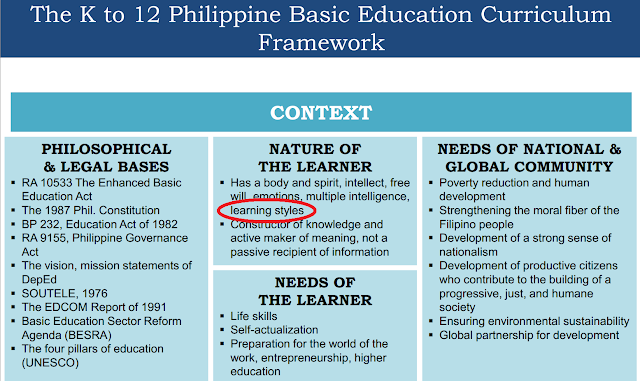The Undying Myth of Learning Styles
In 2012, Dekker and coworkers compiled a list of neuromyths in education. The most prevalent myth found among teachers in the United Kingdom and the Netherlands is:
One must not confuse learning styles with learning disabilities. There are indeed children who perform better with a particular mode of learning. Some children with Attention Deficit Hyperactivity Disorder can process instruction more efficiently when information is written down instead of being announced. In these cases, the style is required by necessity. Learning styles, on the other hand, are more like preferences. Some prefer reading a novel while some enjoy watching a movie based on a novel. Addressing preferences of course may lead to greater satisfaction. Learning better, however, does not automatically follow. In fact, there are now several studies that prove that "Individuals DO NOT learn better when they receive information in their preferred learning style". The following, from the Journal of Educational Psychology, is an example:
Just to reiterate, "Results failed to show a statistically significant relationship between learning style preference and learning aptitude." One interesting result from the study is that those who prefer visual instruction perform better in both listening and reading comprehension than those who prefer auditory instruction. The above study includes only college educated adults who have well developed listening and reading comprehension skills.
It is important not to confuse learning styles with disabilities. Based on the above evidence and others, conforming to what learners prefer does not really lead to greater learning. In fact, catering to what learners prefer may actually prevent them from learning and developing the skills that they need.
Rogowsky and coworkers conclude with the following:
Closely examining DepEd's K+12 will certainly reveal additional myths. That is why there is still a lot of work to be done in order to transform Philippine basic education into something that is based on evidence. At this point, DepEd is simply guided by ill-informed beliefs...
Individuals learn better when they receive information in their preferred learning style (e.g., auditory, visual,kinesthetic).The teachers included in this survey are among those who show interest in scientific studies about the brain and learning. In spite of such interest, these teachers are in fact embracing and propagating a myth. This specific misinformation is so pervasive that even the Philippines DepEd K+12 framework contains the unfounded idea of learning styles:
One must not confuse learning styles with learning disabilities. There are indeed children who perform better with a particular mode of learning. Some children with Attention Deficit Hyperactivity Disorder can process instruction more efficiently when information is written down instead of being announced. In these cases, the style is required by necessity. Learning styles, on the other hand, are more like preferences. Some prefer reading a novel while some enjoy watching a movie based on a novel. Addressing preferences of course may lead to greater satisfaction. Learning better, however, does not automatically follow. In fact, there are now several studies that prove that "Individuals DO NOT learn better when they receive information in their preferred learning style". The following, from the Journal of Educational Psychology, is an example:
Just to reiterate, "Results failed to show a statistically significant relationship between learning style preference and learning aptitude." One interesting result from the study is that those who prefer visual instruction perform better in both listening and reading comprehension than those who prefer auditory instruction. The above study includes only college educated adults who have well developed listening and reading comprehension skills.
It is important not to confuse learning styles with disabilities. Based on the above evidence and others, conforming to what learners prefer does not really lead to greater learning. In fact, catering to what learners prefer may actually prevent them from learning and developing the skills that they need.
Rogowsky and coworkers conclude with the following:
Closely examining DepEd's K+12 will certainly reveal additional myths. That is why there is still a lot of work to be done in order to transform Philippine basic education into something that is based on evidence. At this point, DepEd is simply guided by ill-informed beliefs...



Comments
Post a Comment